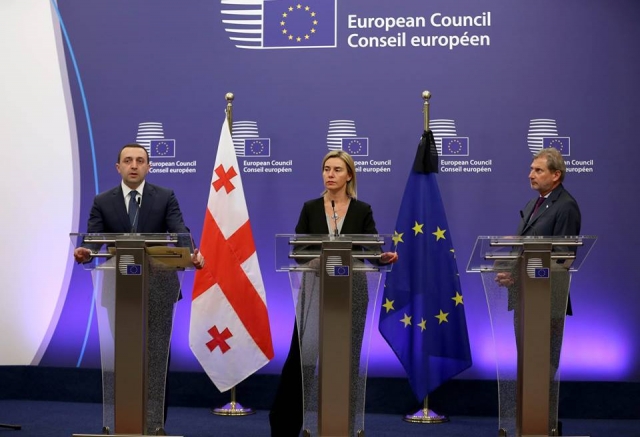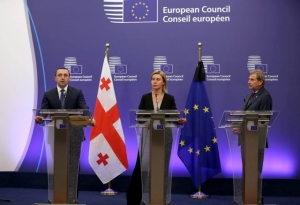EU: Political and Media Pluralism Lucrative
On 16th November the European Union and Georgia held the second meeting of the Association Council, the highest formal body established under the EU-Georgia Association Agreement in order to supervise the implementation of the Agreement.
As the joint press release stated following the event, the Council began by strongly condemning the terrorist attacks in Paris on November 13th. “Countering violent extremism is an important part of our common agenda and we are determined to defend our common freedoms and values as set out in the Association Agreement.”
The Association Council positively assessed the significant progress in EU-Georgia relations since the last Association Council back in November 2014. “Both sides reaffirmed their continuing commitment to Georgia’s political association and economic integration with the EU and acknowledged Georgia’s European aspirations, its European choice and the common objective to promote building a democratic, stable and prosperous country.”
According to official information, the Association Council underlined that the Association Agreement is a concrete way to activate the full potential of EU-Georgia enhanced relations, focusing on support to core reforms, on economic recovery and growth, governance and sector cooperation. “Acknowledging the process achieved in the implementation of the Agreement, the Association Council welcomed the readiness of Georgia to sustain the positive results of the reforms in accordance with the common values set out in the Association Agreement: democracy, good governance, the rule of law and respect for human rights. In this context, the Association Council assessed Georgia as one of the front-runners of the Eastern Partnership.”
The issue of the forthcoming 2016 elections was underlined. “Both sides agreed on the need to maintain democratic momentum in light of the October 2016 parliamentary elections in Georgia. The EU called on all political actors in Georgia to guarantee a free and pluralistic media environment, as well as political pluralism, as a prerequisite for the conduct of democratic elections while refraining from any steps or statements that could increase tension and foster polarization.”
Georgia’s strategic role in the field of energy and transport connectivity was highlighted, noting that the accession of Georgia to the Energy Community Treaty was key to implementing the energy dimension of the Association Agreement.
The EU reiterated its firm support for the territorial integrity of Georgia within its internationally recognised borders. The Association Council expressed concern regarding the developments in the Georgian regions of Abkhazia and Tskhinvali/ South Ossetia, including Russia’s implementation of so-called treaties, deepening integration with the regions and the impact of the illegal installation of signposts along the administrative boundary line on security, livelihoods and freedom of movement of local populations.
The council was chaired by Georgian PM Irakli Garibashvili. The High Representative of the European Union for Foreign Affairs and Security Policy, Frederica Mogherini, led the EU delegation. Johannes Hahn, the European Commissioner for Neighborhood Policy and Enlargement negotiations also participated for the EU. Giorgi Kvirikashvili, the Vice Prime Minister and Minister of Foreign Affairs and other members of the Georgian Government were present.
To view the full text click here:












